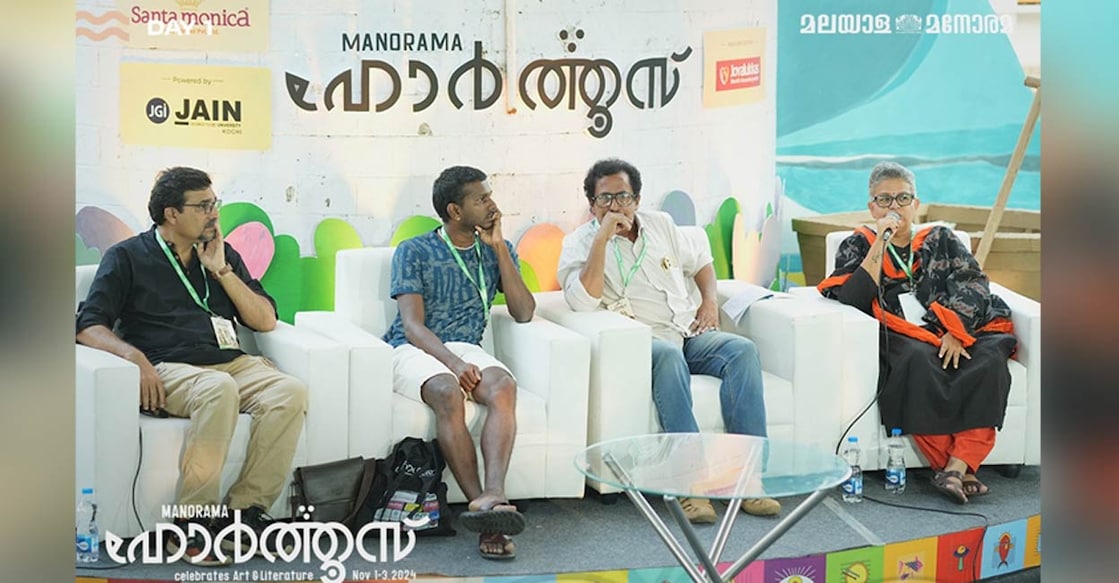Women have internalised the fear of being gazed at with crippling effect: filmmaker Deedi Damodaran

Mail This Article
Kozhikode: Women have deeply internalised being constantly watched through a rigid gender lens and conform to societal norms even when no one is around, said filmmaker and gender activist Deedi Damodaran. "Women wear innerwear even when going to bed, subconsciously adjust their clothes while sleeping, and play in beach waters wearing sarees," she said.
Once, when her mother fell unconscious, she was conscious of keeping her clothes in place, she recalled. "This is because of the invisible cameras that follow women from birth," said Deedi Damodaran.
She was speaking on 'gender politics: you are under surveillance' at Manorama Hortus, the three-day art and literary festival organised by Malayala Manorama.
"We don't use the word surveillance to mean just watching. We use surveillance to say we are watching the wrongdoers," she said.
Breast cancer is the easiest to self-detect, but women don't touch their breasts because of the internalised fear of being watched, said Deedi Damodaran. "We've all felt it — men of our fathers' age, men we respected, would speak to us without meeting our eyes, their gaze instead fixed at our breasts. The discomfort this creates for me is overwhelming because I am a breast cancer survivor," she said.
She said cinemas, too, perpetuate the male gaze. In Shaji N Karun's 'Kutty Srank', Mammootty's nude body is shown. "We saw how a woman looks at a man's body because Anjuli Shukla was behind the camera. It is not that common in the cinema," Deedi Damodaran said.
Though she won a National Award for Best Cinematography, Shaji had difficulty hiring another female cinematographer because no one on the set listened to Anjuli's instructions, she said. "Shaji had to stop his work and give the same instructions for the men to work," he said.
KP Jayakumar, a former journalist, writer and film critic, recalled how when the tsunami hit in December 2004, more women died because of similar reasons. The first wave took the women into the sea. When they tried to get out of the sea, they realised their clothes were either washed away or out of place. They sat back in the water, and the next wave took them away, said Jayakumar, an assistant professor at the Department of Malayalam at NSS College, Cherthala.
As a trainee journalist, he visited the relief camps at Alappuzha's Ambalapuzha. The women in the relief camps waited for days till a delegate of women for them to ask for sanitary pads. They had vaginal infections too but could not tell their husbands or doctors, he said. "I realised that women did not have the language to tell their problems," he said.
Malayalam lacks the vocabulary to discuss gender, Jayakumar noted. "For instance, words such as queer or transgender people are alien to Malayalam. Even the word for gender, lingam, is masculine. We will have to rethink our language itself," he said.
Speaking on surveillance, Amith K, a Mohiniyattam dancer, said he did not even want to understand the question of how a male body can perform Mohiniyattam. He said a body is not static, complete or perfect. "I understand the body as a vibrant, dynamic, constantly transforming thing whose foundation is based on movement.
It can demolish static and rigid power equations," said Amith, who identifies himself as a queer. "I believe my body is evolving, I work on the body. If it is static, there is no dance. There is no dance if the body is pegged to a preconception."
Amith said he could shake the basic notions of a body by performing Mohiniyattam.

